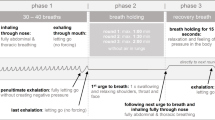Abstract
In the present study 36 police officers were exposed to a psychological stressor (IQ quiz) and to cold pressor stress while several cardiovascular variables were monitored. Impedance cardiography was used to provide measures of heart rate, stroke volume, cardiac output, myocardial contractility, and total peripheral resistance. In addition, measures of systolic and diastolic blood pressure and peripheral skin temperature were obtained. A multivariate analysis of variance (MANOVA) indicated that significant increases in diastolic and systolic blood pressure during the cold pressor test were mediated by large increases in total peripheral resistance, whereas blood pressure elevation during the IQ quiz were accompanied by significant increases in heart rate and, to a lesser extent, cardiac output. Peripheral skin temperature decreased in response to each stressor. Additional analysis indicated a degree of stimulus specificity for several variables. For example, diastolic blood pressure showed greater increases to cold pressor than quiz, whereas systolic blood pressure increased more with the psychological than the physical stressor. Directional fractionation occurred for both myocardial contractility and cardiac output.
Similar content being viewed by others
References
Albright, G. L., Andreassi, J. L., & Steiner, S. S. (1988). Interactive effects of Type A personality and psychological and physical stressors on human cardiovascular functions. International Journal of Psychophysiology, 6, 315–326.
Allen, M. T., & Crowell, M. D. (1989). Patterns of autonomic response during laboratory stressors.Psychophysiology, 26 603–614.
Allen, M. T., Obrist, P. A., Sherwood, A., & Crowell, M. D. (1987). Evaluation of myocardial and peripheral vascular responses during reaction time, mental arithmetic, and cold pressor tasks.Psychophysiology, 24 648–656.
Allen, M. T., Sherwood, A., & Obrist, P. A. (1986). Interactions of respiratory and cardiovascular adjustments to behavioral stressors.Psychophysiology, 23 532–541.
Andreassi, J. L. (1989).Psychophysiology: Human behavior and physiological response. Hillsdale, NJ: Lawrence Erlbaum.
Andren, L., & Hansson, L. (1980). Circulatory effect of stress in essential hypertension.Acta Medica Scandinavica, 648(Suppl.), 69–72.
Ax, A. (1952). The physiological differentiation between fear and anger in humans.Psychosomatic Medicine, 15 422–433.
Engel, B. T. (1959). Some physiological correlates of hunger and pain.Journal of Experimental Psychology, 57 389–396.
Engel, B. T. (1972). Response specificity. In N. S. Greenfield & R. A. Sternbach (eds.),Handbook of psychophysiology (pp. 571–476). New York: Holt, Rinehart, & Winston.
Lacey, J. I. (1959). Psychophysiological approaches to the evaluation of psychotherapeutic process and outcome. In E. A. Rubinstein & M. B. Parloff (eds.),Research in psychotherapy (pp. 173–192). Washington, DC: American Psychological Association.
McKinney, M. F., Miner, M. H., Ruddel, H., McClvain, H. E., White, H., Buell, J. C., Eliot, R. S., & Grant, L. E. (1985). The standardized mental stress protocol: Test-retest reliability and comparison with ambulatory blood pressure monitoring.Psychophysiology, 22 453–463.
Miller, J. C., & Horvath, S. M. (1978). Impedance cardiography.Psychophysiology, 15 80–91.
Mohapatra, S. N. (1981).Noninvasive Cardiovascular Monitoring by Electrical Impedance Technique. London: Pitman Medical.
Schiffer, F., Hautley, L., Schulman, C., & Abelman, W. (1976). The quiz ECG: A new diagnostic and research technique for evaluating the relation between emotional stress and ishemic heart disease.American Journal of Cardiology, 37 41–47.
Sherwood, A., Allen, M. T., Obrist, P. A., & Langer, A. W. (1986). Evaluation of beta-adrenergic influences on cardiovascular and metabolic adjustments to physical and psychological stress.Psychophysiology, 23 89–104.
Author information
Authors and Affiliations
Rights and permissions
About this article
Cite this article
Wilson, B.L., Albright, G.L., Steiner, S.S. et al. Cardiodynamic response to psychological and cold pressor stress: Further evidence for stimulus response specificity and directional fractionation. Biofeedback and Self-Regulation 16, 45–53 (1991). https://doi.org/10.1007/BF01000445
Issue Date:
DOI: https://doi.org/10.1007/BF01000445




